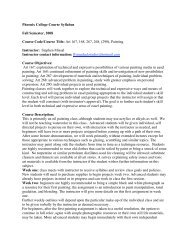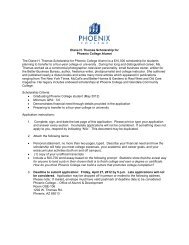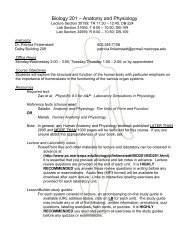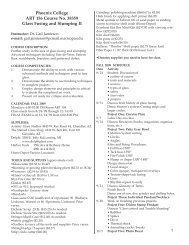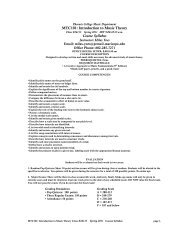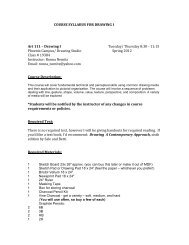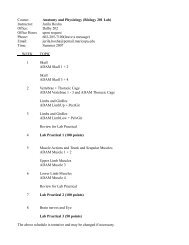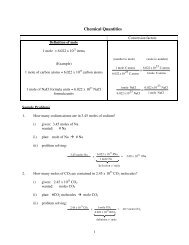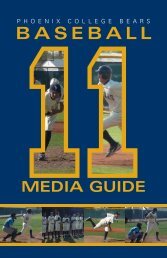Phoenix College Catalog 2009-10
Phoenix College Catalog 2009-10
Phoenix College Catalog 2009-10
Create successful ePaper yourself
Turn your PDF publications into a flip-book with our unique Google optimized e-Paper software.
70 | <strong>Phoenix</strong> <strong>College</strong> <strong>2009</strong>–20<strong>10</strong> CATALOG<br />
MCCCD Common Policies<br />
Transfer Articulation Guidelines<br />
(Appendix S-2)<br />
Articulation Agreements<br />
The Maricopa Community <strong>College</strong>s are dedicated to creating transfer<br />
partnerships with four-year colleges and universities. These<br />
partnerships are formalized through district-wide articulation<br />
agreements. These articulation agreements are designed to help<br />
students make a smooth transition when transferring from one of the<br />
Maricopa Community <strong>College</strong>s to a four-year institution. To access a<br />
list of institutions of higher education with which Maricopa has<br />
established an articulation agreement, visit:<br />
http://www.maricopa.edu/academic/ccta/artic/partner_list.php<br />
Transfer Articulation from Arizona Public Community <strong>College</strong><br />
Districts and Universities into the Maricopa Community<br />
<strong>College</strong>s<br />
Maricopa is a participant in the Arizona statewide transfer system.<br />
The aztransfer.com website is the official source of information for<br />
the statewide articulation agreements between the Arizona public<br />
community colleges and universities (Arizona State University,<br />
Northern Arizona University and University of Arizona).<br />
Transfer Articulation with the Maricopa Skill Center and the<br />
Southwest Skill Center<br />
The Maricopa Community <strong>College</strong>s have agreements with the<br />
Maricopa Skill Center and the Southwest Skill Center in limited areas<br />
of study. Students who have participated in these agreements may<br />
be granted credit for prior learning. No fees will be assessed for<br />
credits awarded for prior learning. Articulated course/program credit<br />
is transferable within the Maricopa Community <strong>College</strong>s, but may<br />
not necessarily be transferable to other colleges or universities.<br />
Students should contact the Admissions and Records Office/Office<br />
of Student Enrollment Services for transfer credit policies and an<br />
academic advisor for a program of study.<br />
Student Financial Assistance (Appendix<br />
S-5)<br />
The Maricopa Community <strong>College</strong>s provide students financial<br />
assistance to enable access to higher education. Student financial<br />
assistance shall be awarded on the basis of demonstrated financial<br />
need except where funds are specified for recognition of special<br />
talents and achievements.<br />
How to Apply for Financial Aid<br />
New students must complete the Free Application for Federal<br />
Student Aid (FAFSA) or FAFSA on the web at: http://www.fafsa.<br />
ed.gov/. Each academic year, continuing students must reapply by<br />
completing a FAFSA, Renewal FAFSA, or FAFSA on the web.<br />
Scholarships require separate applications. Specific information<br />
regarding financial assistance, including application deadlines or<br />
priority dates, may be obtained from the college Office of Student<br />
Financial Aid.<br />
Types of Aid<br />
Grants, loans, student employment, and scholarship funds may be<br />
available from federal, state, and/or private sources.<br />
The Maricopa Community <strong>College</strong>s Foundation offers a variety of<br />
scholarship opportunities. Scholarship opportunities are available<br />
year round. However, most scholarships are posted mid-January and<br />
most deadlines are the last week of March. Options are available by<br />
calling 480-731-8400 or at www.maricopa.edu/foundation/apply<br />
Distribution of Aid<br />
Criteria by which aid is distributed among eligible financial aid<br />
applicants are available on request at the college Office of Student<br />
Financial Aid.<br />
Rights and Responsibilities<br />
Students should read all information provided in the process of<br />
applying for federal financial aid in order to gain a greater knowledge<br />
of all the rights as well as responsibilities involved in receiving that<br />
assistance.<br />
Satisfactory Academic Progress<br />
Specific requirements for academic progress for financial aid<br />
recipients are applied differently than scholastic standards. In<br />
addition to scholastic standards which are explained elsewhere in<br />
this catalog, financial aid recipients are also subject to the following<br />
Standards of Satisfactory Academic Progress. Specific information is<br />
available at the college Office of Student Financial Aid.<br />
Standards of Satisfactory Academic Progress (SAP) for Financial<br />
Aid Eligibility<br />
Federal regulations (CFR 668.32(f) and 668.34) require a student to<br />
move toward the completion of a degree or certificate within an<br />
eligible program when receiving financial aid. Specific requirements<br />
for academic progress for financial aid recipients are applied differently<br />
than Scholastic Standards. Federal regulations state that Academic<br />
Progress Standards must include a review of all periods of enrollment,<br />
regardless of whether or not aid was received. The student must<br />
meet the following minimum standards in order to receive financial<br />
aid.<br />
I. Evaluation of Financial Aid Eligibility<br />
A. Standards of Satisfactory Academic Progress (SAP) are<br />
applied at least once per year, beginning on or about June<br />
1st to determine the eligibility for the following academic<br />
year.<br />
B. The evaluation period will be based on attendance in the<br />
immediate prior Spring, Fall, Summer term (example: for<br />
2008-<strong>2009</strong> academic year, academic progress will be<br />
evaluated on Spring 2008, Fall 2007, and Summer 2007).<br />
C. Credits evaluated will include credits attempted at the<br />
evaluating school and courses funded through consortium<br />
agreement.<br />
D. Students who do not meet the SAP will be notified. The<br />
student may follow the appeal process or the reinstatement<br />
procedures as outlined in V and VI.<br />
II. Eligibility<br />
A. Students must meet the following criteria:<br />
1. Students who have attempted at least 6 credit hours<br />
in the last evaluation period must complete with a<br />
passing grade 2/3 of all credits attempted within that<br />
evaluation period, OR<br />
2. Students who have NOT attempted at least 6 credit<br />
hours in the last evaluation period must complete with<br />
passing grades 2/3 of ALL credits attempted.<br />
AND<br />
B. All students must meet the following minimum credit hour/<br />
cumulative GPA requirement:<br />
Credits Attempted*<br />
12-15 1.60<br />
16-30 1.75<br />
31-45 1.90<br />
46 + 2.00<br />
*for which grade points are computed.<br />
Min GPA<br />
Note: Grades of F,I,N,W,X,Y,Z, and courses not yet graded are<br />
considered attempted but not meeting progress standards for the<br />
purpose of financial aid.



